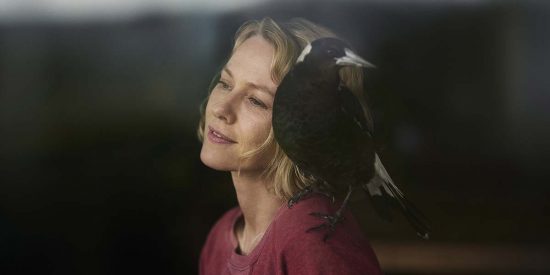TIFF 2020 Review: Penguin Bloom
On a family vacation to Thailand in 2013, the Blooms appear to be making every second count – surfing, strolling the markets, enjoying local foods. We see Sam (Naomi Watts) and her family in a brief collection of family photos and vacation footage before she falls through a railing on a rooftop lookout, landing on the concrete below. She suffers tragic breaks in her T6 and T7 vertebrae, rendering two thirds of her body paralyzed. Penguin Bloom is Sam Bloom’s real life story and how a little bird changed it all.
Back home in Australia Sam is struggling with her new reality. Previously a vibrant, active woman she is now angry, depressed, unable to even view the outdoors through the windows of her family’s home, choosing instead to close the blinds to eliminate reminders of who she used to be. Her husband Cameron (Andrew Lincoln) has become an instant caregiver to not only Sam, but also their three children. She is incapacitated physically and mentally, even questioning how she can be a mother at all. She feels helpless.
One day while down at the beach, their children discover and bring home a wounded magpie who has fallen out of a tree. Naming it Penguin, much to the chagrin of Sam who feels this wild bird should never be contained, the magpie becomes a focus to her and the family allowing them to emotionally heal, as Penguin does herself.
Penguin Bloom is a showcase for Naomi Watts, whose performance here is expectedly wonderful and the standout. However the first act of the film is tough going as Sam understandably mourns what she views as the loss of her life and hates the body she’s trapped within. Once Penguin the magpie enters the scene the mood of the film changes dramatically. Penguin, actually portrayed by 8 different magpies in the movie, is as charismatic an animal actor as you’ve ever seen. The bird’s antics are adorable, and tug at the heartstrings whether she’s cuddling with one of the Bloom family in bed or stealing yet another tea bag from a mug (and stealing the scene with it). Human supporting actors Jacki Weaver as Sam’s effervescent mother and Rachel House (Whale Rider, Thor: Ragnarok) who plays Sam’s kayak coach, bring much needed light, levity and humour to the screen.
However Penguin Bloom suffers a bit for its formulaic approach. It’s predictable and doesn’t trust its audience to recognize the parallels between Penguin’s inability to fly and Sam’s inability to walk (instead relying on they eldest son’s intermittent narration to plainly lay that out). Sam’s real life triumphs are relegated to text at the end of the film. Spending some more time on her becoming a championship kayaker would have added an extra layer to her story and truly recognize that remarkable accomplishment.
That said, director Glendyn Ivin has shot this film beautifully. Using the Bloom family’s actual home creates a sense of warmth and connection, and he never shies away from using their stunning views and light to create a beautiful scene. There is more to like about Penguin Bloom than not, and while it toes the line of becoming saccharine, its human performances and that darn amusing magpie manage to reel it back in. Penguin Bloom becomes a solid, heartfelt film though the most memorable thing about it just happens to be covered with feathers.











